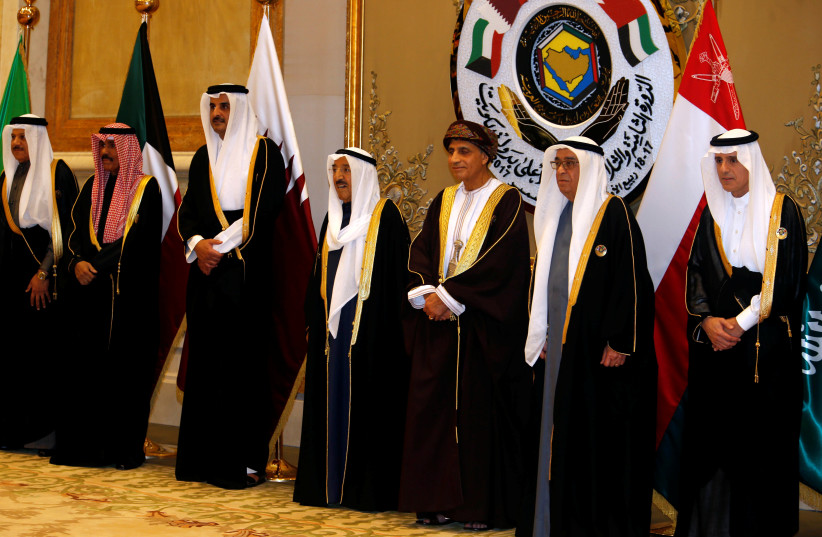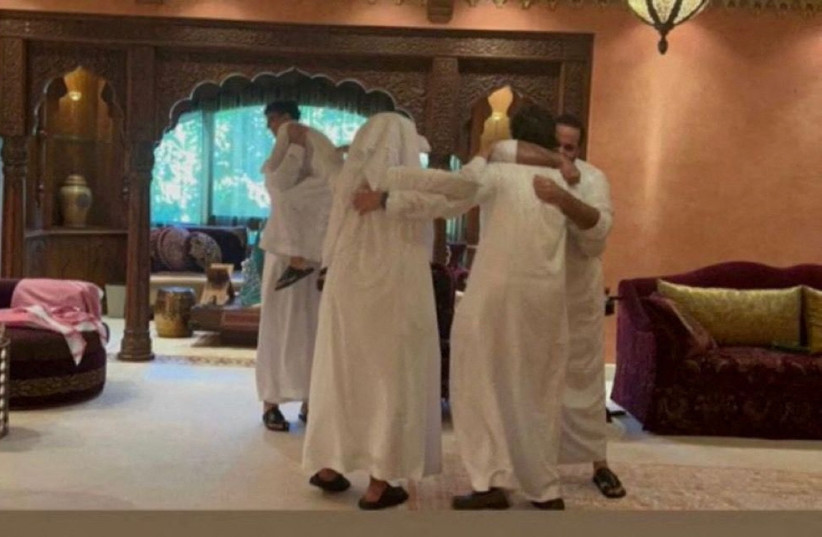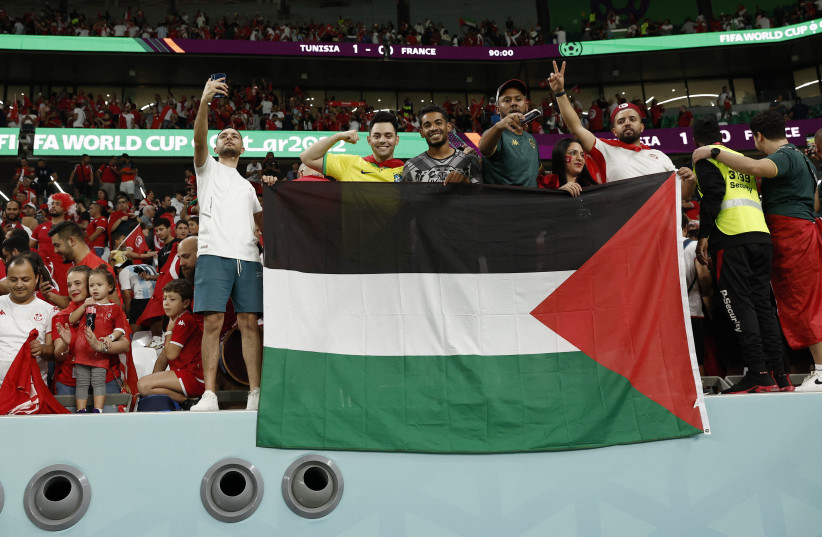The first few days of the 2022 World Cup in Doha, Qatar, have offered a glimpse into what many Arabs have long dreamed of.
For more stories from The Media Line go to themedialine.org
That Arab nationalism is alive and well.
Enemies become friends again
Arab heads of states and governments were all giddy and smiles while attending the opening ceremony of the World Cup, embracing each other and holding the flags of former enemy countries – with Saudi Crown Prince Mohammed bin Salman embracing Qatari Emir Tamim bin Hamad Al Thani, and Egyptian President Abdel Fattah el-Sisi also celebrating with the emir.
In June 2017, Saudi Arabia orchestrated a blockade of Qatar leading the United Arab Emirates, Bahrain and Egypt also to cut ties with Doha. The dispute was only resolved in January 2021.
The Qatari emir attended the match and wore a Saudi flag draped over his shoulders.

Shocking wins by Saudi Arabia over Argentina, and Morocco over Belgium sparked massive excitement throughout the Arab world and put on display a rare Arab unity that hasn’t been seen in decades.
Long-standing, complicated Arab disputes were forgotten as Lebanese, Palestinian, Tunisian, Egyptian and Jordanian soccer fans joined the throng of Moroccan and Saudi fans celebrating in the Qatari capital.
Yasser Al-Mishal, president of the Saudi Football Federation, praised the tiny Gulf state for its organization of the event.
Arab nationalism has a comeback
"This is not the Qatar World Cup. This is the Gulf and Arab World Cup, and what Qatar is offering is the biggest response to the West's skepticism," he told The Media Line.
Ahmad Rafiq Awad, president of the Center for Jerusalem Studies at Al-Quds University, told The Media Line that the World Cup in Qatar shows that “the idea of Arab nationalism is still alive.”
The idea of Arab nationalism is still alive."
Ahmad Rafiq Awad
“But it does not have arms or legs and does not have a reference or a central system to support it. They are strong feelings, and they are the dreams and wishes of the Arab people, but they have lost their luster and role of past years,” he said.
Dr. Uzi Rabi, director of the Moshe Dayan Center for Middle East and African Studies at Tel Aviv University, told The Media Line that Arab nationalism is “kind of a slogan which is a recipe for a unified political entity that is not there. Of course, there's an Arab sentiment, Arab history, heritage and language.”
Rabi says that Arab nationalism can be used as “a framework which can create modus operandi for states in the region,” but he argues that it can’t be a political entity. “This is something that can be used when it comes to sports and culture,” he asserted.
The World Cup debut on Arab soil witnessed an outpouring of support from Arab fans toward the teams of other Arab nations. Many Arab fans whose teams did not earn a spot in the international tournament were seen chanting support for the teams of other Arab countries and draping those flags around their shoulders.
Seeing soccer fans from various Arab states holding the flags of other countries – especially the Palestinian flag – is the clearest sign of a revival of Arab nationalism.

Peace between peoples?
The first-ever World Cup in the Middle East also has become a platform for the political tensions that exist around the region.
For example, another phenomenon making headlines in Doha is the cold reception Israeli journalists covering the World Cup have received from soccer fans, especially Arabs.
A group of Israeli journalists are learning firsthand that normalization agreements are not enough to inspire warmth, despite six peace treaties between Israel and Arab states, and two years after the excitement that accompanied the Abraham Accords agreements that established diplomatic ties with two Gulf States – the United Arab Emirates and Bahrain, in addition to Morocco and Sudan.
Many Israeli reporters said they have experienced "verbal assault," and have lamented their poor treatment at the hands of those attending the international event.
The World Cup in Qatar is another sign that, on the people level, Israel is seen as a hostile country, according to some experts.
Arab nationalism can be used as “a framework which can create modus operandi for states in the region”
Dr. Uzi Rabi
Mohammad Majadleh, news director at Nas Radio in Nazareth in northern Israel, told The Media Line that no one should be surprised by the frosty reception.
"Peace is made with people, not with governments," he said.
"One of the advantages of this World Cup is that it exposed the Israelis to the reality that they do not want to admit, which is that all the imaginary peace agreements with the Gulf states are neither advanced nor delayed as long as Israel occupies the Palestinian land and people," he said.
The Palestinian issue dominates the scene
Rabi says the reason that Israelis are being shunned at the event points to one topic, “basically, it is the Palestinian issue.” But he also blames the “educational system in some Arab states” that reflects hatred of Israel and Israelis.
Many soccer fans refuse to speak to reporters when they find out they are from Israel. Videos circulating on social media have highlighted the cold reception these reporters have faced.
"Peace is made with people, not with governments"
Mohammad Majadleh
Almost every Israeli journalist who has attended the event has been shunned mainly by Arab fans and has had a difficult time getting Arabs to speak to them once the fans discover they work for an Israeli media outlet.
Journalist Raz Shechnik who works for the Israeli daily newspaper Yediot Aharonot, approached a football fan holding a Palestinian flag who refused to talk to him and said: “There is nothing called Israel, it is just Palestine.”
One Tunisian fan hoisted a banner reading, “Free Palestine” when asked for an interview while another told an Israeli journalist attempting to interview him: "No Israel, only Palestine."
Many Israeli journalists, when asked, told the crowd they were from a country other than Israel.
Israel signed the Camp David Accord with Egypt in 1997, and the Wadi Araba Treaty with Jordan in 1994; on the official level relations are warm and professional, but on the people-to-people level it's cold.

The Abrahamic Accords and Arab-Israeli relations
Dorian Barak, head of the UAE-Israel Business Council, told The Media Line that changing the current tension can only happen through grassroots efforts. Barak says he is a "strong believer in people-to-people peace."
"When there’s engagement between Israelis and Arabs from every country you tend to have a warmer relationship. I think the missing ingredient at the people-to-people level is solely one of contact, because we have so much in common," Barak said.
He says that the "political issues that divide us notwithstanding, as individuals we have a lot of culture similarities."
Rafiq Awad disagrees, saying the “Abrahamic Accords did not transform Arab-Israeli relations.”
“There is an impression that as soon as the Israelis arrive in Qatar, they will be greeted with open arms and flowers, and the masses will bear them on their shoulders, forgetting that their successive governments oppress the Palestinian Arab people,” he said.
As long as the Israeli-Palestinian conflict goes unresolved “real normalization won’t happen.”
Rafiq Awad
Rafiq Awad says that as long as the Israeli-Palestinian conflict goes unresolved “real normalization won’t happen.”
He added: “This year alone, more than 150 Palestinians have been killed by the Israeli army. What do they expect a rose and thanksgiving?”
